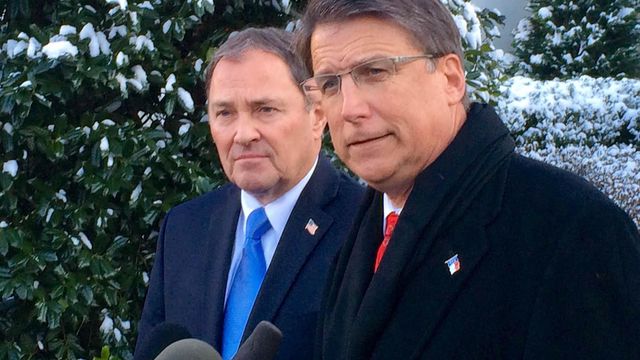New Congress, NC governor in DC on big day
Republicans are assuming full control of Congress for the first time in eight years in a day of pomp, circumstance and raw politics beneath the Capitol Dome.
Posted — UpdatedThey planned to move swiftly Tuesday toward a veto showdown with President Barack Obama over the Keystone XL pipeline, summoning unity despite a tea party-backed effort to unseat House Speaker John Boehner of Ohio.
As mandated by the Constitution, the day begins at noon with the swearing in of the 114th Congress.
Tillis, a former IBM consultant and outgoing North Carolina House speaker defeated Democratic incumbent Kay Hagan in November by fewer than 50,000 votes. Now, the job of senator is his through 2020.
Tillis arrived in Washington for the two-year session that officially began over the weekend expecting to serve on the Senate Armed Services and Veterans Affairs committees, as well as agriculture and judiciary panels and a special committee on aging. Tillis also will have a leg up because the GOP is in charge of the Senate for the first time since 2006.
In the other chamber, Democratic 1st District Congressman G.K. Butterfield will be sworn in as the chairman of the Congressional Black Caucus.
Congressional party leaders ascend
In the Senate, with Vice President Joe Biden presiding, Republican Sen. Mitch McConnell of Kentucky was to automatically ascend to majority leader following his approval by rank-and-file Republicans last year.
McConnell and Boehner both were to deliver remarks on their chamber's floors as they positioned themselves for two years of clashes with Obama.
First, Boehner had to survive his election as speaker – the main event on any opening day's agenda. Tea party-backed congressmen Louie Gohmert of Texas and Ted Yoho of Florida put themselves forward as challengers to Boehner, and at least 10 Republicans announced they would oppose Boehner.
But that was far short of the number needed to place his election in jeopardy, and many lawmakers dismissed the challenge as a needless distraction at a moment when the party should be celebrating new majorities and showing voters it can lead.
"It's time to put all this silliness behind and move on," said Republican Congressman Phil Roe of Tennessee. "We're on probation. If we don't perform ... (voters) can make a pivot in a heartbeat."
Nor did any of the rebels predict they would succeed in toppling the 65-year-old Boehner. Instead, they said the current high command wasn't conservative enough.
Virginia Republican Congressman Dave Brat, who defeated former Majority Leader Eric Cantor in a primary last summer, said the Republican leadership has "strayed from its own principles of free market, limited government, constitutional conservatism."
Two years ago, Boehner faced similar criticism, and sweated out his election to a second term.
His hand is considerably stronger this year after the Republicans' sweeping electoral triumph. The party will hold 246 House seats in the new Congress, to 188 for the Democrats, the biggest GOP majority in nearly 70 years.
The intra-party leadership struggle underscored the political peril facing Republicans as they looked ahead to two-house control of Congress. Yet, the evident ability to pass the Keystone pipeline legislation showed their potential to advance an agenda.
McCrory to meet with Obama
Over on Pennsylvania Avenue, it is North Carolina Gov. Pat McCrory who has the ear of power.
As part of the National Governor's Association executive board, McCrory will be among those meeting with Obama Tuesday afternoon.
McCrory said he is open to expanding Medicaid coverage after he and the General Assembly revamp the program to control costs.
"I've said from the beginning, even last year, that I will not close the door to keeping that option available," he said.
North Carolina is one of 24 Republican-led states that initially refused to expand Medicaid under the Affordable Care Act. About 320,000 low-income workers would have gained health insurance coverage had the state expanded the program.
Medicaid serves 1.6 million state residents. Under the Affordable Care Act, the federal government is committed to paying no less than 90 percent of the costs of expanding coverage for the first few years.
• Credits
Copyright 2024 by WRAL.com and the Associated Press. All rights reserved. This material may not be published, broadcast, rewritten or redistributed.






